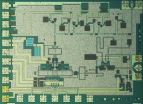Queen's in international 'attosecond' science breakthrough
Scientists from Queen's University Belfast have been involved in a groundbreaking discovery in the area of experimental physics
2014-10-21
(Press-News.org) Scientists from Queen's University Belfast have been involved in a groundbreaking discovery in the area of experimental physics that has implications for understanding how radiotherapy kills cancer cells, among other things.
Dr Jason Greenwood from Queen's Centre for Plasma Physics collaborated with academics from Italy and Spain on the work on electrons, which has been published in the international journal Science.
Using some of the shortest laser pulses in the world, the researchers used strobe lighting to track the ultra-fast movement of the electrons within a nanometer-sized molecule of amino acid. The resulting oscillations – lasting for 4,300 attoseconds (billion-billionths of a second) – amount to the fastest process ever observed in a biological structure.
Dr Greenwood said: "Explaining how electrons move on the nanoscale is crucial for the understanding of a range of processes in matter as it is this charge which initiates many biological, chemical and electrical processes. For instance, the charge produced from the interaction of ionizing radiation with DNA and its subsequent ultra-fast movement can lead to damage of the DNA and cell death which is exploited in radiotherapy to treat cancer. This knowledge is therefore important for understanding the action of radiotherapy beams in cancer treatment.
"Being able to describe how light interacts with electrons on these timescales could also lead to improvements in how light is converted into electricity in solar cells or faster microprocessors which use light rather than electrical signals for switching transistors.
"This research will hopefully open up the emerging field of attosecond science which seeks to understand how ultrafast electrons play a key role in chemistry, biology and nanotechnology. This is very early research but this new field of ultrafast light-induced electronics is likely to have an impact in biology, chemistry and materials in the next five to ten years. Practical applications down the line may include improvements in cancer radiotherapy, highly efficient solar cells and much faster computer processors."
INFORMATION:
The research was carried out by Queen's School of Mathematics and Physics in collaboration with the Politecnico Milano, the Universidad Autónoma of Madrid, University of Trieste and Institute of Photonics and Nanotechnologies IFN-CNR of Padua, Italy. The full paper can be read here: http://www.sciencemag.org/content/346/6207/336.abstract
For more information contact Queen's University communications officers Una Bradley (Mon-Wed) on 00 44 (0)28 9097 5320 or Michelle Cassidy (Thurs-Fri) on 00 44 (0)28 9097 5310 or email comms.officer@qub.ac.uk
Notes To Editors:
Dr Greenwood is available for interview. Media bids to the Queen's University communications office on 028 9097 5320 (Mon-Wed) or 029 9097 5310 (Thurs-Fri) or email comms.officer@qub.ac.uk
Links
Ultrafast Belfast, Queen's University Belfast - http://www.ultrafastbelfast.com
ELYCHE Attosecond Science, Politecnico di Milano - http://www.elycheattosecond.fisi.polimi.it
XChem, Universidad Autónoma de Madrid - http://www.xchem.uam.es
EU Cost Action XUV/X-ray light and fast ions for ultrafast chemistry- xlic.qui.uam.es
ELSE PRESS RELEASES FROM THIS DATE:
2014-10-21
A new study led by researchers at King's College London in collaboration with the University of Manchester and the University of Dundee has found a strong link between exposure to peanut protein in household dust during infancy and the development of peanut allergy in children genetically predisposed to a skin barrier defect.
Around 2% of school children in the UK and the US are allergic to peanuts. Severe eczema in early infancy has been linked to food allergies, particularly peanut allergy. A major break-through in the understanding of eczema developed with the discovery ...
2014-10-21
Fewer cords, smaller antennas and quicker video transmission. This may be the result of a new type of microwave circuit that was designed at Chalmers University of Technology. The research team behind the circuits currently holds an attention-grabbing record. Tomorrow the results will be presented at a conference in San Diego.
Every time we watch a film clip on our phone or tablet, an entire chain of advanced technology is involved. In order for the film to start playing in an even sequence when we press the play button, the data must reach us quickly via a long series ...
2014-10-21
An experimental drug currently being trialled for influenza and Ebola viruses could have a new target: norovirus, often known as the winter vomiting virus. A team of researchers at the University of Cambridge has shown that the drug, favipiravir, is effective at reducing – and in some cases eliminating – norovirus infection in mice.
Norovirus is the most common cause of gastroenteritis in the UK. For most people, infection causes an unpleasant but relatively short-lived case of vomiting and diarrhoea, but chronic infection can cause major health problems for ...
2014-10-21
Amsterdam, October 21, 2014 – Flu vaccines are known to have a protective effect against heart disease, reducing the risk of a heart attack. For the first time, this research, published in Vaccine, reveals the molecular mechanism that underpins this phenomenon. The scientists behind the study say it could be harnessed to prevent heart disease directly.
Heart disease is the leading cause of death worldwide. People can reduce their risk of heart disease by eating healthily, exercising and stopping smoking. However, to date there is no vaccine against heart disease.
Previous ...
2014-10-21
Cosmologists have made the most sensitive and precise measurements yet of the polarization of the cosmic microwave background.
The report, published October 20 in the Astrophysical Journal, marks an early success for POLARBEAR, a collaboration of more than 70 scientists using a telescope high in Chile's Atacama desert designed to capture the universe's oldest light.
"It's a really important milestone," said Kam Arnold, the corresponding author of the report who has been working on the instrument for a decade. "We're in a new regime of more powerful, precision cosmology." ...
2014-10-21
The extinction in the wild of the southern white rhino population could be prevented by letting local communities take responsibility of the animals and giving them permission to harvest horns in a controlled manner through a legal trade. Rhino horn is made of the same material as human hair and fingernails and grows back in 2–3 years.
In 2013, more than 1000 rhinos were killed illegally for their horns in South Africa. Rhino horns are being used in Asia for traditional Chinese medicine and personal prestige. Now, a new study based on ecological and socio-economic ...
2014-10-21
NASA's newest orbiter at Mars, MAVEN, took precautions to avoid harm from a dust-spewing comet that flew near Mars today and is studying the flyby's effects on the Red Planet's atmosphere.
The MAVEN spacecraft -- full name Mars Atmosphere and Volatile Evolution -- reported back to Earth in good health after about three hours of precautions against a possible collision with high-velocity dust particles released by comet C/2013 A1 Siding Spring.
"We're glad the spacecraft came through, we're excited to complete our observations of how the comet affects Mars, and we're ...
2014-10-21
October 20, 2014 – (BRONX, NY) – Rates of depression and anxiety vary widely among different segments of the U.S. Hispanic and Latino population, with the highest prevalence of depressive symptoms in Puerto Ricans, according to a new report from Albert Einstein College of Medicine of Yeshiva University and the Hispanic Community Health Study/Study of Latinos (HCHS/SOL). The researchers' findings also suggest that depression and anxiety may be undertreated among Hispanics and Latinos, particularly if they are uninsured. The study was published online in Annals ...
2014-10-21
Our species' waking and sleeping cycles – shaped in millions of years of evolution – have been turned upside down within a single century with the advent of electric lighting and airplanes. As a result, millions of people regularly disrupt their biological clocks – for example, shift workers and frequent flyers – and these have been known to be at high risk for such common metabolic diseases as obesity, diabetes and heart disease. A new study published in Cell, led by Weizmann Institute scientists, reveals for the first time that our biological clocks ...
2014-10-21
Bethesda, MD (Oct. 21, 2014) — If you are not getting the recommended seven-to-eight hours of sleep each night, you may be at increased risk of developing ulcerative colitis, according to a new study1 in Clinical Gastroenterology and Hepatology, the official clinical practice journal of the American Gastroenterological Association.
"Both short and long durations of sleep have important health implications and are associated with increased overall mortality, cardiovascular disease and cancer," said lead study author Ashwin N. Ananthakrishnan, MD, MPH, Massachusetts ...
LAST 30 PRESS RELEASES:
[Press-News.org] Queen's in international 'attosecond' science breakthrough
Scientists from Queen's University Belfast have been involved in a groundbreaking discovery in the area of experimental physics

